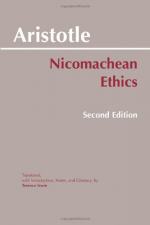
|
| Name: _________________________ | Period: ___________________ |
This test consists of 15 multiple choice questions and 5 short answer questions.
Multiple Choice Questions
1. Which word adequately indicates the character of the man whose vice is in opposition to that of the braggart, according to Aristotle's description?
(a) Congenial.
(b) Truthful.
(c) Ironic.
(d) Lecherous.
2. In I.12, Aristotle states that praise belongs properly to what?
(a) Effort.
(b) Divinity.
(c) Virtue.
(d) Humanity.
3. With what is temperance principally concerned in the mind of Aristotle?
(a) Intellectual virtue.
(b) Pleasures.
(c) Pains.
(d) Sexual deviance.
4. To whom, or what, does Aristotle say the person who commits suicide is being unjust?
(a) The gods.
(b) The city.
(c) His teachers.
(d) Himself.
5. At what does every action seem to aim, according to Aristotle?
(a) Some target.
(b) Some profit.
(c) Some good.
(d) Another action.
6. A buffoon is described by Aristotle in IV.8 as someone who goes to extremes in order to make someone else do what?
(a) Laugh.
(b) Steal.
(c) Cry.
(d) Abjure the gods.
7. In what does Aristotle say modern comedy consists, in IV.8?
(a) Slapstick.
(b) Foul language.
(c) Subtlety.
(d) Puns.
8. What is a suitable category, in Aristotle's view, in which to place the feeling of shame?
(a) Virtues.
(b) Conditional values.
(c) Feelings.
(d) Vices.
9. What extreme is most comparable to the virtue of courage in the opinion of Aristotle?
(a) Rashness.
(b) Cowardice.
(c) Indignation.
(d) Confidence.
10. Aristotle states that one suffers injustice willingly in what situation?
(a) In no situation.
(b) In situations of poverty.
(c) In situations of judgment.
(d) In situations of sacrifice.
11. From Aristotle's perspective, against the yardstick of what do men generally compare their actions?
(a) Truth and falsity.
(b) Pleasure and pain.
(c) The archetypal man.
(d) Vice and virtue.
12. With what is V.10 concerned?
(a) The equitable.
(b) The oligarchy.
(c) The aristocracy.
(d) The distributable.
13. According to Aristotle, the highest good must be something that is what?
(a) Difficult to obtain.
(b) Incomplete.
(c) Complete.
(d) Easily obtained.
14. In what do most people take refuge, according to the theory proposed by Aristotle, rather than perform virtuous acts?
(a) Pleasure.
(b) Talk.
(c) Vice.
(d) Philosophy.
15. What determines, according to Aristotle's arguments in V.8, the justice or injustice of one's actions?
(a) Whether or not it deals with the whole person.
(b) Whether or not it is done willingly.
(c) Whether or not it deals with the community.
(d) Whether or not it is reciprocated.
Short Answer Questions
1. Aristotle states that the good of one person is also, to a different degree, the good of what according to I.2?
2. Which of the following is NOT characteristic of Aristotle's magnanimous man?
3. By what means, according to Aristotle in V.5, does a community or a city stay together?
4. In how many ways does Aristotle speak of good things in I.6?
5. With what is the virtue of generosity concerned, according to Aristotle?
|
This section contains 434 words (approx. 2 pages at 300 words per page) |

|




